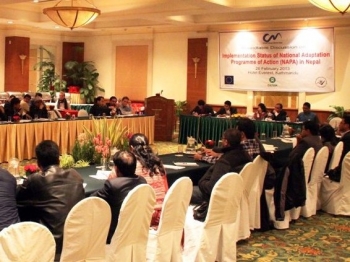News Detail
Speedy implementation of NAPA urged
 Nepal is in the process to access approximately US$ 37 millions from various bilateral and multi lateral funding sources to implement the projects identified in National Adaptation Programme of Action (NAPA). From Least Developed Country Fund (LDCF) under the United Nations Framework Convention on Climate Change (UNFCCC), Nepal is in the process of accessing around US$ 18 million out of USD 20 million allocated for each member country. NAPA is a key document prepared by the Government of Nepal in 2010 to address urgent and immediate adaptation needs to adapt to the impacts of climate change. It had identified nine combined profile adaptation projects estimating US$ 350 million as the cost for implementation.
Nepal is in the process to access approximately US$ 37 millions from various bilateral and multi lateral funding sources to implement the projects identified in National Adaptation Programme of Action (NAPA). From Least Developed Country Fund (LDCF) under the United Nations Framework Convention on Climate Change (UNFCCC), Nepal is in the process of accessing around US$ 18 million out of USD 20 million allocated for each member country. NAPA is a key document prepared by the Government of Nepal in 2010 to address urgent and immediate adaptation needs to adapt to the impacts of climate change. It had identified nine combined profile adaptation projects estimating US$ 350 million as the cost for implementation.
In a round table discussion on implementation status of NAPA in Nepal organized by Climate Change Network Nepal (CCNN)/Clean Energy Nepal (CEN), Mr. Prakash Mathema, Joint Secretary and Head of Climate Change Management Division, Ministry of Science, Technology and Environment (MoSTE) stated that "Nepal as a chair of Least Developed Country group in the UNFCCC will negotiate in future for separate windows to support for the implementation of NAPA projects and for preparation of the National Adaptation Plans (NAPs)." NAPs address the medium and long term adaptation needs of all members countries of the UNFCCC whereas NAPAs address urgent and immediate adaptation needs.
A research conducted in 18 districts of Nepal by CCNN/CEN showed that in many districts climate change projects are being implemented without the institutional framework as specified in the NAPA document. Participants in the programme emphasized on the formulation of the institutional framework at the district level and enhance their capacity to implement climate change projects. Participants criticized the government for not giving enough priority for the implementation of projects identified by NAPA even after two and half years since its endorsement by the government of Nepal.
Sonu Singh who came to participate in the program from Bajhang said that the Bajhangis are waiting long for NAPA programs to be implemented at a time district is already reeling under the impacts of climate change.
Ajay Dixit, Executive Director of ISET Nepal and the moderator of the panel discussion concluded the session highlighting that facts and information about the climate change is key factor while defining vulnerability and adaptation needs of any community. "Government commitments on climate change should also be reflected through legal provision such as policy and acts," said Dixit.
To download document related to this news, please visit news at CEN website
Add Your Comment